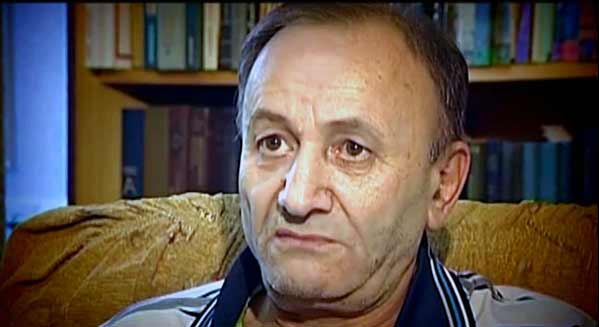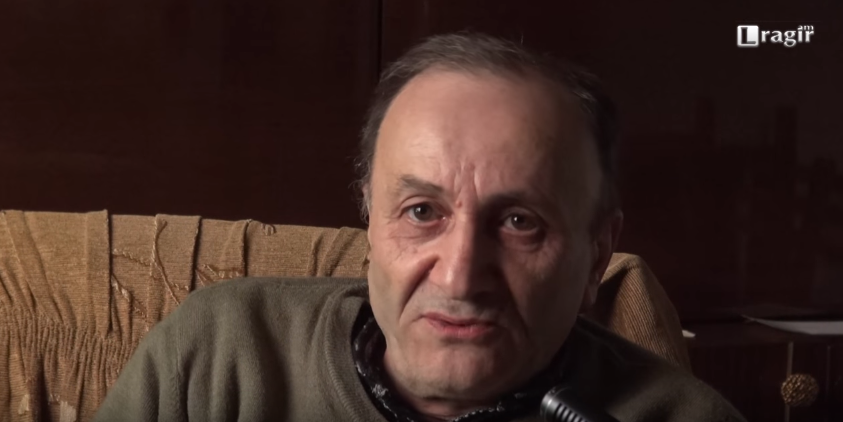Quarterly Report on the Human Rights Violations in the RA Military Forces (Vol.2)
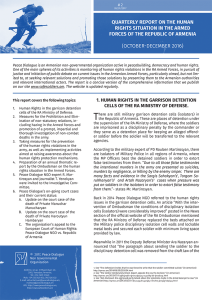
Peace Dialogue is an Armenian non-governmental organization active in peacebuilding, democracy and human rights. One of the main spheres of its activities is monitoring of human rights violations in the RA Armed Forces, in pursuit of justice and initiation of public debate on current issues in the Armenian Armed Forces, particularly aimed, but not limited to, at seeking relevant solutions and promoting those solutions by presenting them to the Armenian authorities and relevant international actors. The report is a concise version of the comprehensive information that we publish on our site www.safesoldiers.am. The website is updated regularly.
This report covers the following topics:
- Human Rights in the garrison detention cells of the RA Ministry of Defense.
- Measures for the Prohibition and Elimination of non-statutory relations, including hazing in the Armed Forces and promotion of a prompt, impartial and thorough investigation of non-combat deaths in the army.
- Taking measures for the prevention of the human rights violations in the army, as well as implementing activities aimed at raising awareness about the human rights protection mechanisms.
- Preparation of an annual thematic report by the Ombudsman on the human rights situation in the Armed Forces.
- Peace Dialogue NGO expert R. Martirosyan and journalist T. Yenokyan were invited to the Investigative Committee.
- Peace Dialogue’s on-going court cases and their current status:
A. Update on the court case of the death of Private Manuchar Manucharyan
B. Update on the court case of the death of Private Haroutyun Hambaryan
C. The organization’s appeal to the European Court of Human Rights: Peace Dialogue NGO vs. RA
1. Human Rights in the garrison detention cells of the RA Ministry of Defense.
There are still military garrison detention cells (isolators) in the Republic of Armenia. These are places of detention under the supervision of the RA Ministry of Defense, where the soldiers are imprisoned as a disciplinary penalty by the commander or they serve as a detention place for keeping an alleged offender soldier before the soldier will be transferred to the relevant agencies.
According to the military expert of PD Rouben Martirosyan, there are isolators of Military Police in all regions of Armenia, where the MP Officers beat the detained soldiers in order to extort false testimonies from them. “Due to all those false testimonies the intentional murders in the army are presented as suicides, murders by negligence, or killing by the enemy sniper. There are many facts and evidence in the Sargis Sahakyan’s, Torgom Sarukhanyan’s and Artak Nazaryan’s cases when pressure was put on soldiers in the isolators in order to extort false testimony from them.”- states Mr. Martirosyan.
Back in 2014 Peace Dialogue NGO referred to the human rights issues in the garrison detention cells. An article “With the intervention of Ombudsman the conditions of disciplinary isolation cells (isolators) were considerably improved” posted in the News section of the official website of the RA Ombudsman mentioned that the RA Ministry of Defense replaced the beds attached on the Military police disciplinary isolation cell walls and lockable metal beds and secured each soldier with minimum living space provided by law.
Meanwhile in 2011 the Deputy Defense Minister Ara Nazaryan announced that “the paragraph about sending the soldier to the disciplinary detention cell was removed from the draft law of the RA MoD Military Disciplinary Code”. According to him the elimination of the mentioned disciplinary penalty was one of the major changes in the draft law which did not correspond to the Constitution since detention can be carried out only by a court decision. By the new disciplinary regulations, the undisciplined soldiers should serve in the disciplinary battalion, instead of serving the penalties in the isolators.
In reference to the above-mentioned statements, PD sent inquires to the Ombudsman to find out the reason why the RA MoD disciplinary isolators were improved when their existence is contrary to the constitution. After all, according to the RA Constitution, a person can be deprived of liberty only by a court judgment entered into force.
It should be noted that the Ombudsman’s office sent some clarifications to Peace Dialogue regarding the article “With the intervention of the Ombudsman the conditions of disciplinary isolation cells (isolators) were considerably improved”. For example, the Ombudsman mentioned that the article was talking not about the disciplinary isolators of the Military Police (although it was mentioned in the article), not about the detention places for arrested soldiers or those who were sentenced to detention by court, instead it was about the detention cells of the Disciplinary Battalion of Kanaz hospital and the RA MoD Lori region garrison isolators. However, so far Peace Dialogue has not received comprehensive answers to the issues raised, neither from the Ombudsman nor from the Ministry of Defense.
Nevertheless, the observation of the RA government decisions of 2015 shows that under government’s decision N 111 issued on 15.01.2015, the first sub-paragraph of point 109 of the RA Government’s Action Plan 2015 particularly mentions that by the Government decision N595 issued on May 22, 2008 there are clarifications and changes made in the internal regulations of the Republic of Armenia Defense Ministry’s military detention cells, which are related to the living conditions of the places of detention for the persons arrested or sentenced to punishment in the disciplinary detention cells. The issues were recorded during daily activities, as well as during the visits of the RA Human Rights Defender’s office employees.
At the same time, the first sub-paragraph of Point 110 of the Action Plan for National Strategy on Human Rights Protection approved by N 111 decision of the RA Government dated 15.01.2015 particularly talks about the necessity of introducing a draft law on making amendments and additions to the RA Law of “Military Police”. The Government’s decision particularly states:
“In the current law there are no regulations that define the functions of the Military Police in the disciplinary company, disciplinary battalion and disciplinary isolators, in the meantime, the operational duties, requirements for professional activities and working skills of the Military Police officers are not clearly defined, which essentially creates problems of transparency in the military activities of the police, and in the process of ensuring defense and guarantees of human rights and fundamental freedoms in the armed forces.
Peace Dialogue NGO sent inquiries to the RA MoD regarding the mentioned government decisions to find out:
- What actions have been taken by the Ministry towards the implementation of the government decision so far?
- What is the reason that the action defined by the Action Plan 2015 has not been implemented so far?
- When is the mentioned action expected to be implemented?
In response to PD’s inquiry, the Ministry of Defense states that, in accordance with the Constitutional amendments, a deadline was set by the Government decision in March 2016 for submitting a draft law until the first week of December 2017.
It is still not clear how the approval of the internal regulations of the RA MoD garrison disciplinary isolators, the revoking of the Government’s decision N 595 issued on May 22, 2008 and making amendments and additions in the RA Law on Military Police will affect the situation of the human rights in the MoD garrison disciplinary isolators, therefore after receiving additional information regarding these issues we will certainly refer to this topic in our follow up reports.
2. Measures for the Prohibition and Elimination of non-statutory relations, including hazing in the armed forces and promotion of prompt, impartial and thorough investigation of non-combat deaths in the army.
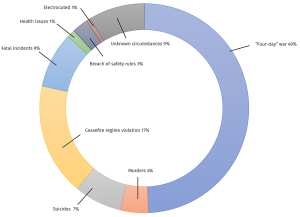
According to the observations carried out by Peace Dialogue NGO regarding the fatalities in the Armenian and NK Armed Forces, the number of death cases is 162. Moreover, 80 of them were recorded during the “four-day” war in April, 2016. Within the same period there were 7 murders and 12 suicides recorded by the organization, while 28 soldiers died as a result of the ceasefire regime violation, 14 soldiers in fatal incidents, two soldiers as a result of health issues, and 4 soldiers as a result of breach of safety rules. One soldier died in yet unknown circumstances by being electrocuted. The organization has not received comprehensive information about the causes of death of 13 soldiers and one volunteer yet. It is important to mention that the presented numbers are based on the data released by the official institution in one way or another. However, due to constant monitoring from 2013, Peace Dialogue recorded several cases that the investigative bodies investigate the case in a wrong direction. This is to stress the importance of the civil society control for the promotion of prompt, impartial and thorough investigation of non-combat deaths in the army.
In the Paragraph 35 of the National Strategy on Human Rights Protection adopted by the RA Government on February 27, 2014, it was assigned to strengthen the measures for the elimination of the non-statutory relations in the armed forces until the fourth quarter of 2016, as well as to ensure a prompt, impartial and thorough investigation of non-combat deaths in the army. The government assigned the RA Ministry of Defense as a responsible body for implementing this action.
In regards to the government’s decision Peace Dialogue sent an inquiry to the RA MoD requesting the following information.
- What actions exactly have been carried out by the RA MoD for the elimination of non-statuary relations in the RA armed forces as of the deadline set by the RA Government?
- What measures or actions of special training have been carried out for raising awareness about the prohibition of torture and ill-treatment and for whom?
- If such actions were carried out, representatives of how many organizations and how many people took part in them, what results were recorded after the implementation of those actions?
- We kindly ask you, if possible, provide us with an official document or any other source that verifies the implementation of the RA MoD actions and measures aimed at elimination and prohibition of non-statutory relations in the armed forces.
In a response letter from the MoD it was mentioned that a number of activities were carried out with the employees of Military Police, the internal office for the Staff Issues, and the RA MoD, as well as with the pre-conscription age children with the support of the OSCE Yerevan office. For example, it was mentioned that the RA Military Police implemented a number of activities with the participation of the regional divisions; together with the commanders direct meetings were held with the soldiers inclined to indiscipline, as well as with parents, war veterans and others; visits to trials were organized. The Military Police staff each month at least three times carried out military service in the combat posts.
In cooperation with the OSCE Yerevan office, trainings were held in the military units with the recruits by expert teams of sociologists, lawyers, and psychologists. Psychological features of a serving recruit were presented with specific examples and general recommendations were made for preventing possible negative behavior which may results in such cases. In the framework of the trainings on human rights, including the ones aimed at raising awareness among the conscripts about the prohibition of torture and other forms of ill-treatment, trainings have been held on Human Rights in the armed forces since 2014 with the support of the OCSE Yerevan office.
According to the information provided by the MoD, representatives of Military Police and of the internal office for the Staff Issues took part in the training. The training focused on introducing the first generation of human rights, as well as developing practical skills and simulation court games on the topics of the right to life, respect for dignity, and exclusion of torture and other cruel, inhuman treatment and other relevant topics.
Moreover, in the response letter of the MoD it was mentioned that the issues of torture and other forms of ill-treatment were discussed during the training sessions supported by the OCSE Yerevan office, in which the staff of the RA MoD Military Police disciplinary companies, recruits, officers and pre-conscription age schoolchildren took part.
However, from the answer it is not clear why in the approaches for the prevention and elimination of the non-statutory relations in the armed forces the emphasis was put specifically on the psychological aspect and not on raising the legal awareness or the development of respect towards human rights and democratic values. Besides, it is also not clear how many people participated in those sessions in total and what results were achieved. The Peace Dialogue NGO has not been able to obtain any evidence confirming the implementation of the aforementioned actions.
3. Taking measures for the prevention of the human rights violations in the army, as well as implementing activities aimed at raising awareness about the human rights protection mechanisms.
To increase general awareness of pre-conscription age schoolchildren regarding the military service and the rights and duties of soldiers, the RA Government under its decision N 303 of the National Strategy on Human Rights Protection adopted on February 27, 2014, assigned an action called “Implementation of concrete actions aimed at preventing human rights violations in the armed forces, and raising awareness about the mechanisms of human rights protection.”
With that action, it is expected to increase general awareness of pre-conscription age schoolchildren about the military service and the rights and duties of soldiers, and review, if necessary, the methodology of teaching about the military service and the rights and duties of soldiers, and the human rights in the armed forces in general within the framework of a school classes on Primary Military Training.
By the governmental decision, the following bodies were assigned as responsible bodies for the implementation of the action:
- The RA Ministry of Defense
- The Office of the RA Human Rights Defender (with their agreement)
- The RA Ministry of Education and Science
The deadline for the action was set for the second quarter of 2016.
Peace Dialogue has sent inquiries to the aforementioned institutions to find out the following:
- As of the deadline set by the government’s decision, what concrete actions were carried out for increasing the general awareness of pre-conscription age schoolchildren about the military service and the rights and the responsibilities of the soldiers? Based on what methodology were these actions carried out among pre-conscription age schoolchildren?
- How many educational institutions were involved in these actions (we asked for a list), and how many schoolchildren participated?
- Was there a necessity to revise the methodology of teaching about the rights and responsibilities of the soldiers, and human rights in the armed forces in general within the framework of the school classes on Primary Military Training?
- If the methodology of the school classes on Primary Military Training was revised, where can the modified methodology or methodological manual be found? Which state and public institutions have been involved in developing the new methodology?
From the response that we received from the RA Ministry of the Science and Education and the RA Ministry of Defense it is clear that the actions taken to increase the general awareness about the military service, and the rights and the responsibilities of the soldiers are also carried out with the support of the OSCE Yerevan office, particularly within the framework of the school classes on Primary Military Training (PMT).
In the response letter, it is particularly mentioned that at the moment actions are underway to review the textbook on teaching the PMT, which is scheduled to be completed in 2017.
Despite the fact that the response letter talks about the effectiveness and successful implementation of the project, it is not clear yet what were the indicators of the success and how the evaluation of the project was carried out.
Neither the RA Ministry of Defense nor the Ministry of Education and Science did provide Peace Dialogue with information about the methodology that was used for the implementation of the activities among the pre-conscription age schoolchildren. The agenda of the activities was also not provided.
It was not mentioned how many institutions were involved in the activities and how many schoolchildren took part in the activities.
It should be noted, that Peace Dialogue NGO has prepared a project called “The dissemination of human rights protection mechanisms among the pre-conscription age young people” regarding the issues discussed, which aims at improving the human rights situation in the RA Armed Forces, particularly by increasing the level of legal awareness among the future conscripts.
4. Preparation of an annual thematic report by the Ombudsman on the human rights situation in the Armed Forces.
Under the Action Plan for National Strategy on Human Rights Protection approved by #303-N decision of the RA Government dated February 27, 2014, Paragraph 114 defines the following: “Pursuant to the RA law on “Human Rights Defender”, prescribe the publication of an annual theme report on the situation of human rights in the RA Armed Forces according to PACE 1742 (2006) Recommendation via the RA law on “Human Rights Defender” prior to the establishment of the institute of Military Ombudsman.
The deadline of the action is set to be the first quarter of 2016; however the mentioned report by the Human Rights Defender was not published. In response to PD’s inquiry, Ombudsman Arman Tatoyan mentioned that, nevertheless, a special report is being prepared as a summary of the situation of the human rights in the armed forces for 2016.
5. Peace Dialogue NGO expert R. Martirosyan and journalist T. Yenokyan were invited to the Investigative Committee.
On August 21, 2016 an article entitled “How the army mafia works” was published in the Lragir.am website. After its publication, the PD expert R. Martirosyan and the author of the article journalist T. Yenokyan were invited to the Investigative Committee via a phone call.
It should be noted that R. Martirosyan refused to present to the Investigative Committee because of being summoned in such an improper way (via a phone call) and said he would do so only after receiving a proper notice in writing.
In order to receive clarifications regarding the invitation to the Investigative Committee, Peace Dialogue NGO sent inquiries to the RA Investigative Committee, the General Prosecutor’s Office, and the RA Human Rights Defender with the following questions:
- What materials of criminal case are being prepared regarding Mr. Martirosyan’s interview (the number of the materials was asked to be provided)?
- Why Mr. Martirosyan is not informed about this process in a proper manner?
- Why those who prepare the materials against Mr. Martirosyan are not interested in the facts that he possesses.
- In what way can we present to the investigators all the materials at our disposal?
- Under which article of the Criminal Code the investigator is given the right to invite the person who reported about a crime to the Investigative Committee via a phone call and inform him about the materials initiated.
In a response letter of the Prosecutor’s Office it was mentioned that the Investigative Committee has prepared materials, however, there was a decision made to reject the initiation of a criminal case taking into consideration that the evidence of reporting about a specific crime was absent in the published article. It was also mentioned that the Investigators invited Mr. Martirosyan to give explanations via a phone call which is not forbidden by the Criminal Procedure Code. In the letter received from the Investigative Committee it was mentioned that R.Martirosyan did not report about a crime and that the materials were initiated not based on the publication of a citizen but a media outlet.
6. Peace Dialogue’s on-going court cases and their current status.
Peace Dialogue provides legal support to all those citizens whose rights were violated or are being violated during their military service. The organization also provides support to the family members of the soldiers who died in relatively non-combat conditions acting as the victim’s legal representative during the stages of investigation and trial.
A. Update on the court case of the death of Private Manuchar Manucharyan.
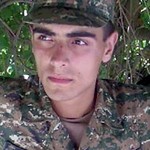 According to the official version on July 31, 2013 at approximately 1:40 pm. Private RA army Manuchar Meruzhan Manucharyan (Born in 1994, drafted in spring 2012 from Vanadzor commissariat, serving at military unit # 24923 located in Kanaker) while on service on the watchtower, shot himself to the chin three times from 5.54 mm rifle gun and died instantly.
According to the official version on July 31, 2013 at approximately 1:40 pm. Private RA army Manuchar Meruzhan Manucharyan (Born in 1994, drafted in spring 2012 from Vanadzor commissariat, serving at military unit # 24923 located in Kanaker) while on service on the watchtower, shot himself to the chin three times from 5.54 mm rifle gun and died instantly.
A few days later, the victim’s brother Onik Meruzhan Manucharyan who is representing the victim in the murder case and his legal representative Peace Dialogue NGO expert Ruben Martirosyan were convinced that a false and biased investigation was carried out.
During the court hearing on July 21, 2016 over the suicide case of Private Manuchar Manucharyan (according to the official version he was driven to suicide) the Judge partially accepted the joint motion of the defendant and the injured party to have a new posthumous forensic medical examination.
Thus, it is envisaged that considering the newly discovered circumstances, a new expert opinion will be given by the same expert organization.
Peace Dialogue’s expert explains that the situation of this case is unique and unprecedented: all the evidence points that there was a fourth gunshot wound on Manuchar Manucharyan (from behind, in the area of the thigh bone). Mr. Martirosyan insists that it was not a suicide but a murder.
If the same expert organization changes its report based on the newly revealed evidence, the supplementary examination may result in an acquittal verdict and the case may be returned to the preliminary investigative body for a new investigation.
It should be noted that the supplementary examination is underway for already six months. The first examination was carried out within two months, whereas the criminal case material (7 volumes) was far more extensive that the court documents and less time must have been required for the investigation of the latter.
The trial of this case is underway and it will enter a new stage after the upcoming expert results will be revealed.
B. Update on the court case of the death of Private Haroutyun Hambaryan.
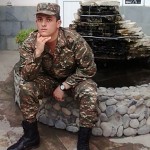 According to the criminal case, Private Haroutyun Hambaryan shot himself to the forehead on May 8, 2015 from a rifle gun attached to him. The same day the RA Investigative Committee initiated a criminal case and an investigative group was formed.
According to the criminal case, Private Haroutyun Hambaryan shot himself to the forehead on May 8, 2015 from a rifle gun attached to him. The same day the RA Investigative Committee initiated a criminal case and an investigative group was formed.
On May 21 a soldier of the same unit D. Haroutyunyan was arrested and charged under Article 359, Part 1 (Breach of relations, prescribed by field manuals, between servicemen not subordinated to each other, expressed in humiliation of the person’s honor and self-esteem, persecution or violence) and Article 360, Part 1 (Insulting a serviceman, i.e. humiliation of honor or self-esteem concerned with the implementation of one’s service duties, by another serviceman) of the RA Criminal Code. D. Haroutyunyan has not accepted the charges against him.
7 months following the incident charges were brought to Arthur Sevumyan, Haykaz Matevosyan, Hovhannes Melkonyan, and Smbat Hayrapetyan. The accused soldiers, unlike Havid Haroutyunyan, confessed that they were guilty.
The legal successor of the victim (his father) does not agree with the suicide hypothesis brought by the preliminary investigative body. He is convinced that his son did not commit a suicide but was murdered. He turned to the Peace Dialogue NGO and the organization’s expert criminologist Rouben Martirosyan became involved in the case and now, during the preliminary investigation and judicial phases of the case, he acts as the representative of the victim’s successor. During the court proceedings, R. Martirosyan filed the appropriate complaints to all relevant authorities and presented facts that the preliminary investigative body, particularly the investigator N. Avetisyan, committed 3 violations in the case:
- Openly covered up the murder through false and biased investigation;
- The investigator extracted and destroyed a number of important documents from the criminal case which were pointing to one or more people who committed the actual murder that the Army is trying to present as the suicide;
- In gross violation of the Criminal Procedural Code, he sent the case to the Court depriving the aggrieved party of the opportunity of motions, provided by law. The motions that could file the missing aspects of the investigation and disclose the intentional murder.
In the response to a number of complaints, the Peace Dialogue NGO received a letter which read that by the decree of the Head of the Investigative Committee a service investigation is carried out by the Security Department of the Investigative Committee. However, later, the employee of the same department in a phone conversation with the aggrieved party mentioned that an investigation is carried out by the order of the RA President’s office. On August 10 the Peace Dialogue NGO received a letter from the Head of the Security Department stating that a penalty was appointed against the investigator.
The judicial proceedings of the case is still underway. During the past quarter no trail took place.
C. The organization’s appeal to the European Court of Human Rights: Peace Dialogue NGO vs. Republic of Armenia.
Since its formation one of the aims of Peace Dialogue NGO has been the human rights protection in the armed forces and promoting impartial and transparent investigation of offenses.
 Since 2012 Peace Dialogue NGO implemented a number of projects aimed at protecting human rights in the armed forces. In particular, the organization provided support to the legal successors of the soldiers who died in relatively peaceful conditions by protecting the rights of the successors in court, promoted raising public awareness about the human rights situation in the army, promoted the documentation of the death cases and offenses in the army, their analysis and the prepared recommendations aimed at preventing such cases.
Since 2012 Peace Dialogue NGO implemented a number of projects aimed at protecting human rights in the armed forces. In particular, the organization provided support to the legal successors of the soldiers who died in relatively peaceful conditions by protecting the rights of the successors in court, promoted raising public awareness about the human rights situation in the army, promoted the documentation of the death cases and offenses in the army, their analysis and the prepared recommendations aimed at preventing such cases.
In the framework of its project “Safe soldiers for a Safe Armenia” the organization created a database www.safesoldiers.am which includes more than 940 fatalities in the armed forces. In order to receive clarification regarding these issues, Peace Dialogue NGO has sent inquiries to the RA MoD numerous times, which however remained unanswered or were rejected on various grounds.
On November 7, 2014 Peace Dialogue applied to the RA Minister of Defense requesting that the ministry provides official information on the death of soldiers for the period of 1994-2014, including the full names of the deceased soldiers, the location of the incidents, the dates, the unit numbers, the respective unit commander’s full names and ranks, the cause of death and a brief description of the incident. However, no answer was given to that inquiry.
On January 17, 2015 Peace Dialogue filed a lawsuit at the Administrative Court, under the bases that the information requested in the inquiry dated 07/11/2014 was not provided within a period prescribed by law, and requested administrative penalties against the Minister under Article 189.7 of the Code of Administrative Offenses. Based on the paragraph that guarantees seeking, receiving and imparting information and based on the norms of the Law on Freedom of Information.
Peace Dialogue filed another lawsuit to the Administrative court against the RA MoD requesting to oblige the Minister of Defense to provide the information requested in an inquiry dated 07/11/2014. During the court proceedings dated 12/08/2015 the Ministry of Defense filed a motion to suspend the administrative proceedings and invoked as a ground for rejection Point 42 of the executive order N9 of the Minister of Defense. The organization applied to the Minister of Defense requesting to provide all the documents that serve the basis of the decree N 9, as well as the copies of all the documents that served the basis for preparing the “Expanded list of departmental information system of the RA Ministry of Defense, appropriate to classification.” However, the MoD answered that during the preparation of the executive order N9 the internal correspondence was performed confidentially and the copies of the documents cannot be provided.
The organization sent an appeal to the Administrative Court requesting to annul Point 42 and Point 43 of the executive order N 9 of the Minister of Defense dated 09/07/2015, since they contradict with the Article 9 of the RA Law on State and Official Secret which has a higher legal effect and which defines the extensive list of information on official and state secret.
This list of information however does not include the information mentioned in Point 42 and 43 of executive order N 9. Therefore, the encryption of the information was carried out with the violations of the encryption principles of legality, validity and timeliness. Moreover, the restriction of the right to seek and receive information provided by Article 27 of the RA Constitution and Article 10 of ESHR does not serve any legal purpose and it is unnecessary in democratic societies. It should be noted that all the motions to the Court to be provided with all the documents that served the basis for preparing an extensive list of classified information and the bases of the executive order N 9 were rejected by the Court.
After exhausting all the remedies, with the support of lawyers Moushegh Shoushanyan and Arthur Soukiasyan, who act as legal representatives of PD, the organization has sent an appeal to the European Court of Human Rights (ECHR).
The organization announced that the interference into its right to receive the mentioned information was not prescribed by law and was not based on the law, since the access to the mentioned information was limited by executive order N9 of the RA Minister of Defense dated 09/07/2015. The information mentioned in Point 42 and Point 43 of #9 executive order of the RA Minister of Defense and in the “Expanded list of departmental information system of the RA Ministry of Defense, appropriate to classification” is not included in the list of the classified information provided by the RA Law on State and Official Secret, does not fit into the formulations prescribed by law and does not ensure the implementation of the provisions of the law.
The organization also finds that the restriction of the information mentioned in Point 42 and Point 43 obviously does not aim at protecting the national security and the national Courts conclusions that the disclosure of the information mentioned in Point 42 and Point 43 of #9 executive order of the RA Minister of Defense will contain threat to the security of Armenia is purely an abstract conclusion since it does not provide real prove that the disclosure of the information may present real threat to state security.
The organization argues that the vague and abstract reference of a threat to state security served one purpose only – to justify, under the excuse of protecting the public interest, not only the restriction of the organization’s right to receive information but also the restriction of the rights of family members of the deceased soldiers and to deny the right of the entire community to be informed about the causes of the death of the soldiers. This way the Ministry hinders the expansion of public discussion on the deaths in the armed forces which is aimed to reveal their causes, analyze the violations and develop proposals on preventing such cases.
Therefore, the organization was deprived of an opportunity to carry out the functions of a “public observer” and provide the public with accurate and reliable information and to initiate a platform for a public debate.
Peace Dialogue insists that in violation of the Article 6 (1) of the ECHR, the Administrative Court rejected the organization’s motion to be provided with justification within the judicial proceedings of the case challenging the Points 42 and 43 of the Executive Order N 9. The court deprived the organization of an opportunity to receive all necessary documents that would provide justification regarding the encryption of the information and the violations of the principle of timeliness.
Thus, the Court deprived the organization of a very important opportunity to challenge the legitimacy of the executive order and the opportunity to present the organization’s stand on this, putting the organization in a less favorable position compared to the opponent who had all the documents and the information.
Further information about the case will be provided in our next quarterly reports.
 Download Quarterly-Report-on-the-Human-Rights-Violations-in-the-RA-Military-Forces-Vol.2 (Vol.2) (pdf, 287 kB)
Download Quarterly-Report-on-the-Human-Rights-Violations-in-the-RA-Military-Forces-Vol.2 (Vol.2) (pdf, 287 kB)
Posted 04 April, 2017


